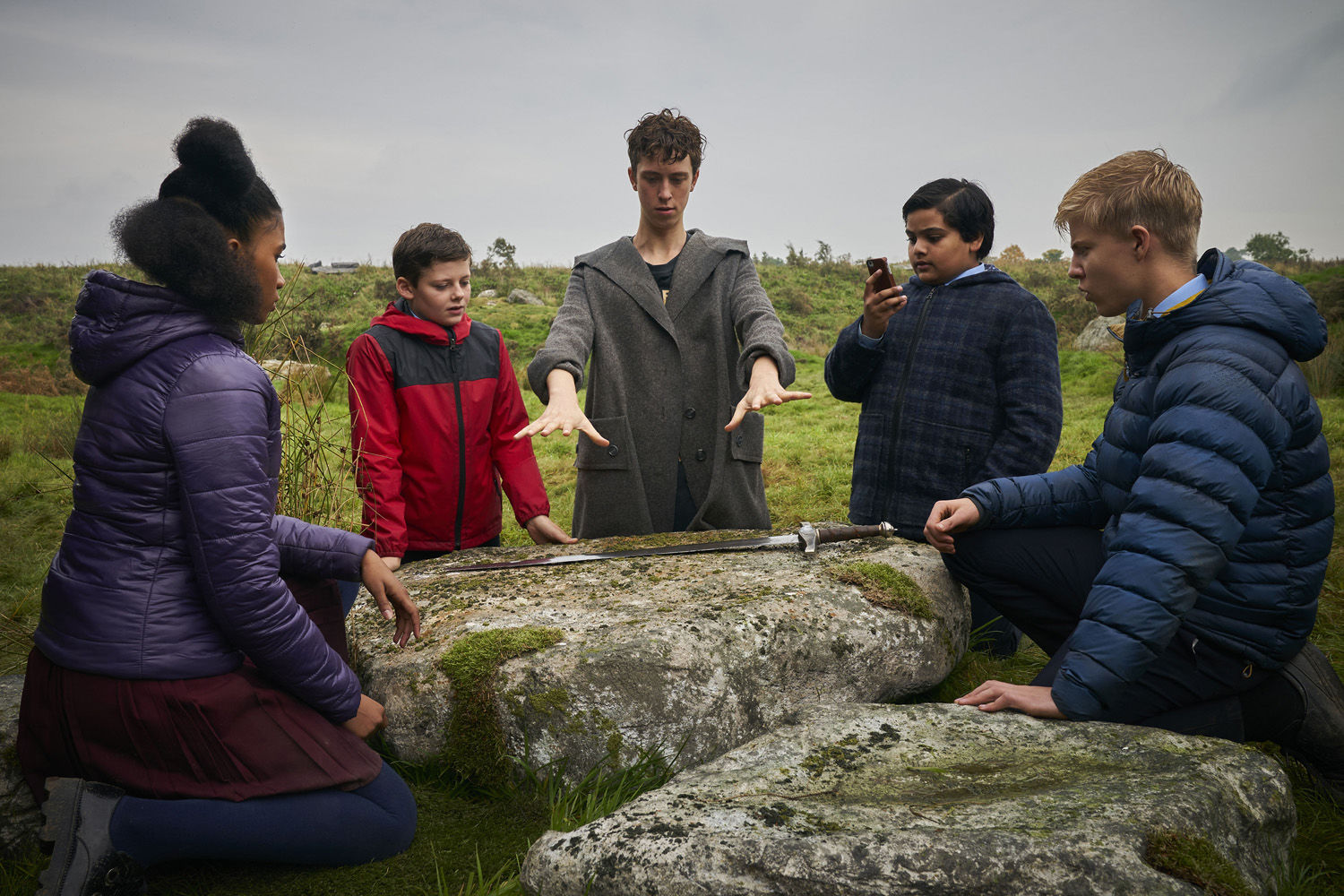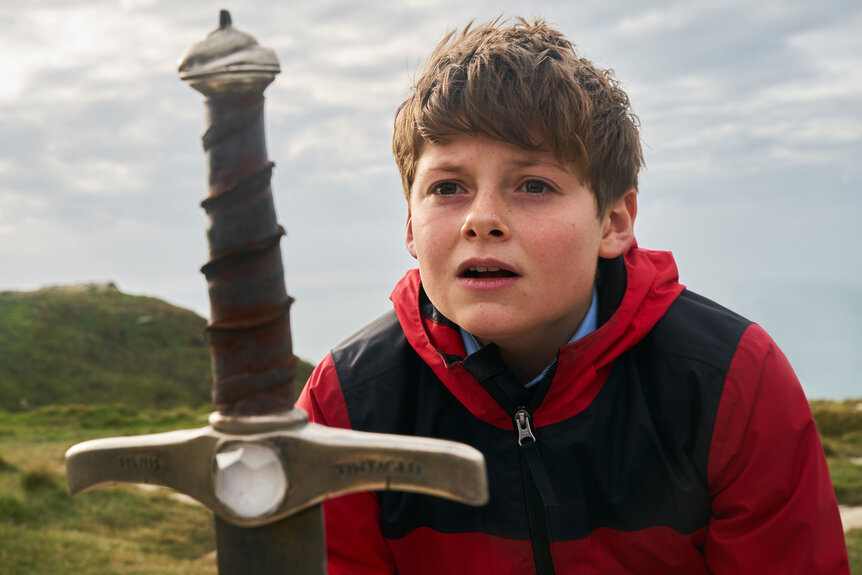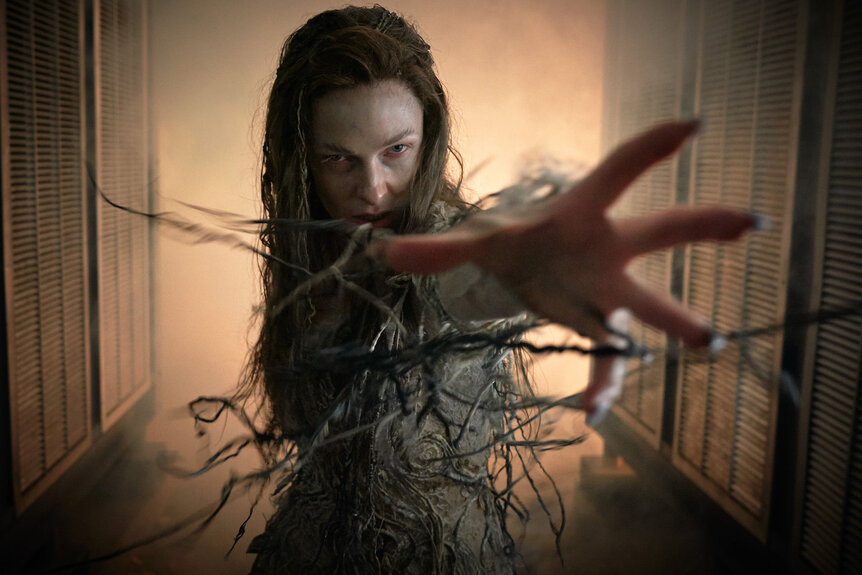Create a free profile to get unlimited access to exclusive videos, sweepstakes, and more!
Joe Cornish disappeared after Attack the Block. Here's how his The Kid Who Would Be King comeback happened

If you’ve seen Joe Cornish’s name in entertainment stories between 2011 and 2019, it’s entirely possible that the little parenthetical next to his name credited him with any number of high-profile projects that, for one reason or another, never quite came to fruition.
But the writer-director of Attack the Block finally has an official follow-up, The Kid Who Would Be King, arriving in theaters on January 25, ending what for us was a drought of invigorating, creative, imagination-filled adventures, and for him, the question “when are you going to do another movie?”
An update and reimagining of the Arthurian legend, Cornish’s film brings to life an idea that he first conceived as a movie-loving kid and which he was only able to complete after realizing that it was more satisfying — and unexpectedly, successful — to create from scratch in Hollywood than try and work for hire.
SYFY WIRE recently spoke with Cornish about the origins, both mythic and personal, of The Kid Who Would Be King. In addition to talking about the kid adventure films that inspired him, and inspired him to make some important tweaks to their formulas, Cornish discussed the themes that sometimes deliberately, sometimes incidentally connect his film to current events, and finally, reflected on the years when his career, much like so many of the projects he’d tried to tackle, got stuck in the “development hell” that he hopes won’t repeat itself now that he has proven he’s capable of bigger challenges.
I along with the majority of the Internet have been eagerly awaiting your next project. How much was it a matter of circumstance or choice that kept you from finding a project before now?
Well, it's certainly been longer than usual. And it's a bunch of circumstances. It was going straight into Ant-Man and staying loyal to Edgar [Wright], and I spent a couple of years working very hard on that. And while I did that I wrote a screenplay for Snow Crash and developed another project for Universal.
And then Snow Crash didn't get greenlit by Paramount, and the Universal project, Section 6, didn't get greenlit. I think Snow Crash is just too huge and ambitious and complicated and sophisticated for a modern studio, really, even though it was amazing to write and amazing to get to talk to Neal Stephenson — it was a fantastic universe to spend time in as a writer. And Section 6 is a sort of historical thriller and I think Universal was frightened by historical stuff.
And then, of course, Ant-Man ended up with Edgar dropping out, which was a bummer, but also an amazing learning experience. So once all that was done, that was when I figured, if I'm gonna do something, rather than taking what they call an assignment, a big franchise or something that needs a director, so why not try and get something that is personal off the ground and that's when I started the process of this.
What have those obstacles taught you about the stories that you want to tell and, and the ones that seem the likeliest maybe to get told?
I think it's interesting that the one that really came from my heart was the one that got made. Not that I didn't really love the other projects, but they were all other people's stuff that other people had offered. And this really came from the bottom of my heart, like Attack the Block did, is the one that got made. I mean, it's a very different movie. Attack the Block is a movie for older teenagers. This is a movie for younger kids, so it's a different audience I think, but it's certainly the same author.
Talk about why this story felt important to tell, or why it particularly resonated with you.
It was an idea I had when I was a kid. I was always coming up with ideas for movies because I was a big movie fan and I happened to grow up in a period when there were all these fantastic kids movies being made in Hollywood like The Black Stallion and E.T. and Explorers and Stand By Me and The Goonies and Gremlins — all these fantastic adventure movies, a lot of which starred young kids my age. And so I would fantasize about what kids movie I would make, and this was my idea — to make a kind of fantasy adventure, a cross between E.T. and Excalibur, the Spielberg film and the John Boorman film where a normal schoolboy discovered the Sword in the Stone.
So it’s an idea I've carried in my tiny brain for many, many years and it's always been my fantasy to make it, so when Attack the Block got a bit of success and I was able to pitch stuff around, this is the one I started working on.
There are obviously some clear parallels to current events. How much of its story and themes were driven by what's going on right now, and how much by what is sort of always going on?
It's weird. Attack the Block came out in May, and then London descended into riots later that summer, and this movie seems to be coming out at precisely when the Brexit vote is happening — tonight, in an hour and a half. So yeah, both movies by as much coincidence as design have come out at times where their themes are quite resonant, and I don't know why that is.
The Arthurian legend is about a divided country that needs a leader, a place where different tribes have factionalized and are fighting each other; it’s a place that desperately needs unity. And that's who Arthur is, he’s a mythical figure, a symbol of unification. And weirdly, in Britain, in the States, in many places in the world, that seems to be the situation. And also, the movie is about aged, dormant evil, that when we think they have vanished, we realized that they’re still kind of alive but hidden and then they rise up again. So I think it's a tough coincidence — half maybe just what I feel in the world when I'm writing, I suppose because it's nice to write up some sort of resonance. A lot of these movies have a secret sort of contemporary relevancy.
E.T. came out of the time when divorce was quite a new phenomenon and single-parent families were quite a new phenomenon in the early ‘80s. Close Encounters was very much tied into the big movement for people's kind of yearning for some big otherness. So hopefully one of the things that a decent movie has is some sort of connection to what people are broadly feeling; that was the ambition anyway.
This movie definitely capitalizes on some of those '80s kid movie conventions. What was the process of figuring out a way to play into some of those expectations and subvert other ones?
One of the first ideas I had was this notion of hereditary privilege. And I noticed that a lot of great myths are to do with children who were abandoned by a powerful family for some reason, and brought up by hermits or wizards or they’re orphaned to aunts and uncles — brought up in reduced circumstances. And then when they come of age, they suddenly discover that they are bonded by blood into this dramatic lineage of great power. That exists in Star Wars and Oliver Twist and Harry Potter and The Bible, King Arthur, and it seemed weird to me that so many very famous stories had the idea of bloodlines at the center and that it was something we were telling children a lot, the idea that secretly you’re a princess or the son of a famous wizard, or Darth Vader’s your dad and he's an incredibly powerful Jedi!
And everybody can't be like that, is the first thing. The second thing is that it's actually a hangover from medieval times when families were incredibly motivated to protect their lineage, and I think it's an old message. So I wanted to construct a story that actually went in the opposite direction, and that ‘80s story archetype of child with a single parent and an absent father and great jeopardy and journey all connects to those Joseph Campbell monomyth ideas, but also connects to various narrative archetypes. So it felt like a good structure to use to attempt to subvert that familiar message.
How tough was it to balance the kid fantasy parts of this story and those more serious emotional or even political themes?
I did my best! It's a tough thing to do. A movie like E.T. does it so eloquently, the way it switches between domestic drama and high fantasy and chase sequences — and I did my best to do all of those things. I guess Lord of the Rings is the biggest, most famous quest movie that most kids know, and that was a useful archetype for the kids to leave their village, so to speak, and have to do a massive trek across country.
The challenge was then to weave in this backstory about Alex's dad and the idea that he has to turn his enemies into his allies. But I think it's pretty easy in terms of wish fulfillment because I remember as a kid wishing I could have some sort of big adventure like I saw at the movies. I was desperate for something like that to happen to me. And I'd walk around just fantasizing it in my head all the time. So really writing this movie was a process of just externalizing all those childhood fantasies.
Attack the Block is an amazing movie, but it's not a conventional or maybe accessible in a way that this one might to Hollywood. Do you feel like this will facilitate being able to work again more quickly?
Well, I hope so. I really rule out that if some project came along that I really fell in love with, I would definitely do something that I hadn't written. But I think one of the good things about this movie is it's not a massive budget but it's a lot bigger than Attack the Block and it's got a lot of special effects work, a lot of locations, a lot of big action sequences, so it's also a good way to cut my teeth and to just make sure that I had some experience on a larger scale movie before jumping into something bigger.
Because as we both know, lots of directors make little indie movies that are successful and then jump into a big massive blockbuster that’s 100 times the budget, and sometimes that can be tricky or they don't have the control because they're in the deep end. Hopefully doing this gives me a little bit of knowledge and experience to do something bigger.
Are those other projects you previously didn’t get funded things that you'd be eager to sort of either revive or follow through on if the opportunity came back up?
Of course, absolutely. Movies take a long time. There's lots of examples of screenplays that have been around for 10 or 20 years. The Favourite, that movie that's doing so well, has been around for 20 years. So nothing is ever dead.
Ultimately, how much if at all was this sort of a throat-clearing moment for you to get past the false starts and the roadblocks that you've dealt with in the past and feel like you're actually working?
It was really good. There's nothing better than to be working on a film you really feel passionately about. But I think there's probably also nothing worse than working on a film that is in some way compromised or was taken away from you or you feel is not the thing you really dreamed about doing. Because filmmaking is very hard work and it's three years of your life, every day, every waking hour. So it felt fantastic. I do want to do the next one a little bit faster though. I think maybe seven years is a tad too long.
















